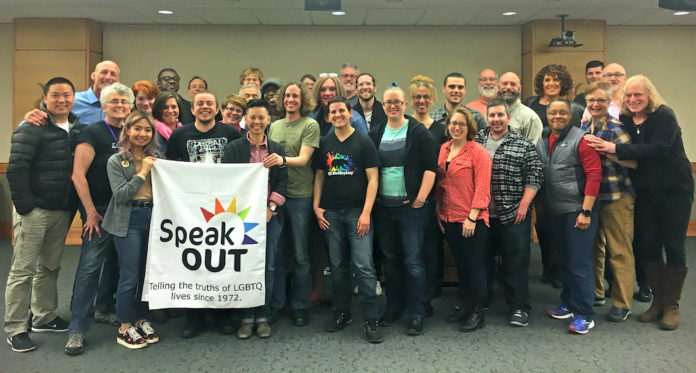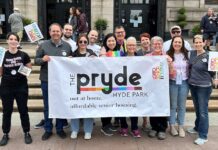[This article appears in the May/June 2022 issue of Boston Spirit magazine. Subscribe for free today.]
“I was a very naive and closeted guy who grew up in Buffalo, New York, in the ’60s and ’70s,” said Scott Grady. “I didn’t come out until I was 24 after moving to Denver, Colorado. I didn’t come out to my family until I was 30. It was a difficult journey for my parents at first.”
“My story is about coming out to my very Catholic, Vietnamese refugee mother,” said Jenn Nguyen. “As the only girl among my siblings, I felt a lot of pressure to be obedient and presentable. I was afraid that my queer identity would be a disappointment to my mom.”
“Growing up in Salem,” recalled Trevor Boylston, “with no positive representation of LGBTQ+ people in mainstream media or neighbors who were out and proud, I didn’t have the language to tell people I was a boy. I experienced dysphoria throughout my teenage years and into early adulthood.”
These are the voices of three of the more than 100 people who comprise SpeakOUT, a community of LGBTQ+ speakers who, by sharing their stories, are working to create a world “free of homo-bi-transphobia and other forms of prejudice.”
Now in its 50th year, executive director Ellyn Ruthstrom, sees an ever-present need for SpeakOUT. “Some people might think we want to put ourselves out of business by the world achieving a blanket understanding of LGBTQ+ lives, but I actually think that there will always be a need for our community to share our stories and to celebrate our unique and diverse identities and experiences,” said Ruthstrom.
“As part of our 50th anniversary, we’ve just updated our logo to include the Progressive Pride flag colors, which reflects our commitment to the BIPOC and transgender communities,” Ruthstrom said.
Changes in attitude
SpeakOUT’s roots took hold in Boston when members of the early lesbian and gay rights organizations Daughters of Bilitis and the Homophile Union of Boston joined forces to create the Gay Speakers Bureau. The organization changed its name to “emphasize the importance of what we do: we speak out,” said Ruthstrom, pointing out that they now represent a “rich diversity of the LGBTQIA community, including bisexual, transgender, queer, intersex, and asexual people.”
“When I came on as executive director in 2014, there were still some clients who would explicitly tell us nots to send transgender speakers, but now most of our clients insist on having trans and nonbinary speakers included on a panel,” Ruthstrom said. “There is a lot of interest in gender identity and trans and nonbinary experiences. We just had an engagement in Watertown, and a trans student came up afterwards and thanked our trans speaker for sharing her story. Our speaker was the first adult trans person they had met, and it meant a lot to them to hear her.
“On a personal note, I feel it’s really important to have an out bisexual leader of an LGBTQ+ organization, and I know that my visibility has attracted a lot of bi+ speakers to the group,” she added.
SpeakOUT recruits its speakers throughout the LGBTQ+ community and has a wide age range—from college students to retirees.
“One of the best parts of my job is seeing our speakers grow through the experience of sharing their stories,” said Ruthstrom. “They gain confidence, yes, but it’s more than that. Telling and retelling their story allows them the opportunity to connect the dots of their experiences in a deeper way, and you can see people own their history in a transformative way.”
‘Ah-ha’ moments
For Trevor Boylston, the past four years as a SpeakOUT member have proven to be “extremely cathartic.”
“It allowed me to let go of deep-buried emotional baggage that I didn’t even know I was still carrying. It made more emotional room for the good things in my life, and more capacity to deal with challenges,” he said.
“Most of my life, I have been a shy and quiet person, but SpeakOUT makes me feel like my voice matters,” said Jenn Nguyen, a member since 2017. “It’s a validating experience. Now if I had to do public speaking on how to solve a math problem, we would be in trouble!”
Scott Grady has been with SpeakOUT for almost three decades and said it was the desire to give back that prompted him to join. “I was raised in a family that valued community service,” he said. “After coming out, I wanted to give back to the LGBT community that I was a part of, [and] while there was growing acceptance in parts of Boston, there was still a lot of work to be done.”
Boylston said one of the reasons he has continued as a speaker is witnessing those “ah-ha moments and knowing that the LGBTQ+ people in their lives will have a better ally, better parent, better manager.”
“It’s normalizing being part of the queer community,” he said. “I am white. I am married. I have a good job with a company that supports the LGBTQ+ community. I identify as a straight male. I am in a very safe, very privileged position. I share and speak because I can and if I do, maybe I’m making it a safer place for folks who don’t share that privilege.”
For Grady, an added benefit as a SpeakOUT member is what he’s gleaned from others. “The courage and integrity of so many of my fellow speakers as they have sat in front of some tough audiences to share their stories has definitely been a significant factor in boosting my confidence in myself as a gay man,” he said.
“No one can tell you how to feel or how to experience life,” said Nguyen, “I can own my story with confidence. I do this because it brings me joy to engage with my community and to help people craft their own personal stories. Seeing a person light up because they’ve owned their story is a fulfilling experience.”
Growing during a pandemic
As it was for many of us, the pandemic provided a platform for SpeakOUT to launch an online presence and allowed it to reach far beyond its Greater Boston and New England audiences, a practice it plans to continue.
“Though we are getting back to in-person gigs, our online format will remain as a great way to reach more spaces that can benefit from our programs,” Ruthstrom said. “If we are able to get the financial support, I would love to be able to expand our trainings to other regions and have even more speakers share their stories with our online audiences.”
Reaching out to communities of color has also been a goal of SpeakOUT, and once again, the pandemic provided the opportunity. “During COVID, an affinity group called SpeakOUT in Color formed to provide a social and support space for speakers of color. This group sparked more discussions within the organization to initiate a board-driven DEIB (diversity, equity, inclusion and belonging) committee that is centering racial diversity within our organization and will be a major focus for the organization going forward,” Ruthstrom said.
“I would like to see the funding become available to sustain and manage a Boston SpeakOUT organization that could be a parent group that provides training and support for satellite SpeakOUT groups all over the country, especially in parts where prejudice and abuse is still prevalent against the LGBTQ community,” said Grady.
Nguyen agreed, adding, “I would like to see more speakers of color and more engagements where the audience is predominately people of color. That is the overarching purpose of SpeakOUT in Color, the affinity group that I helped to create, after all!”
Said Boylston, “I would love to see a broader reach into the BIPOC community and speakers with multilingual capabilities. The engagements are often highly personal and emotional. Being able to engage with a speaker who communicates in your primary language would be a service to the community. Closer engagement with business ERGs and Pride in Our Workplace and other organizations that can support and advance the organization may be worth considering.”
‘Ask Us Anything’
Offering their audiences the opportunity to uphold SpeakOUT’s motto, “Ask Us Anything,” has provided some interesting queries.
“I was once asked if I liked my name,” said Grady. “That seemed odd to me, and after inquiring more closely, I discovered that they were asking, assuming all gay guys have one—what my drag name was LOL! … By the way, it’s Lady Grady.”
“I have been asked if there was a pill that could make me straight, would I take it?” he recalled. “The answer is no. And I have been asked if I have ever hit on any of my straight friends. They wish, LOL.”
Recalled Boylston, “The funniest would be the student that asked if my mother had named me Trevor when I was born. That always makes me chuckle.
“The most difficult came from a student at Wellesley High School, and it revolved around the right of a business to refuse service and how that is balanced with nondiscrimination laws. This was around the time that Massachusetts was considering protection for trans folks in public accommodations. For folks who have maybe never experienced true discrimination, it is a challenge to help them understand how subtle it can be and that it doesn’t always look like a sign on the door saying ‘No Transgender Customers.’”
As for Nguyen, “My favorite question has been ‘what does the rainbow flag mean to you?’ My panel peers answered that question differently, and the various responses were interesting. Some felt it was an inviting symbol; others felt caged in as if it were queerbaiting. My previous assumption would be that all queers loved it, but we’re not a community that can be easily boxed in. We all have differing perspectives and experiences.”
Teaching moments
Addressing students and faculty at public and private middle and high schools is a pivotal role for SpeakOUT members.
“Students listen to the personal stories and often ask very good follow-up questions to understand the speaker’s life better,” Ruthstrom said. “I think it’s really important for students to hear from LGBTQ+ folks who are 45 and older to understand the societal change that has gone on over the last several decades, and our older members are very committed to providing role models to youth because they know what it feels like to not have that experience.
“We believe that the education and awareness building we do is still making a difference and helping schools, businesses, faith communities, and more to provide safe and LGBTQ+ friendly spaces for all,” she added.
Ruthstrom points out that while this part of the country has done a lot of work to educate itself about the LGBTQ+ community, “when you scratch the surface, you can pretty easily find pockets of ignorance and misinformation out there,” she added.
When an underground LGBTQ+ student organization from Gordon College invited SpeakOUT to address students on its North Shore campus, the Christian college’s administration made some stipulations. “[We] were only allowed us to speak if we would share the stage with speakers who basically believed in ‘praying the gay away,’” said Ruthstrom. “We agreed and our speakers spoke to a packed auditorium and had a respectful sharing of views. Afterwards, our speakers were thanked by many of the students in the audience and the student group felt wonderful about having the opportunity to have their perspective represented on campus.”
In his 28 years as a speaker, Grady has seen change.
“Locally, I would have to say that I’ve seen great acceptance of gays, lesbians, and bisexuals when I speak to schools and community groups,” he said. “There is a tremendous amount of work necessary, however, on behalf of the trans community. While our culture is definitely moving in the right direction, I know that there are still kids struggling with their sexual orientation or gender identity who will always benefit from the stories/experiences shared by those of us who have been there.”
More: speakoutboston.org
Not a subscriber? Sign up today for a free subscription to Boston Spirit magazine, New England’s premier LGBT magazine. We will send you a copy of Boston Spirit 6 times per year and we never sell/rent our subscriber information. Click HERE to sign up!









